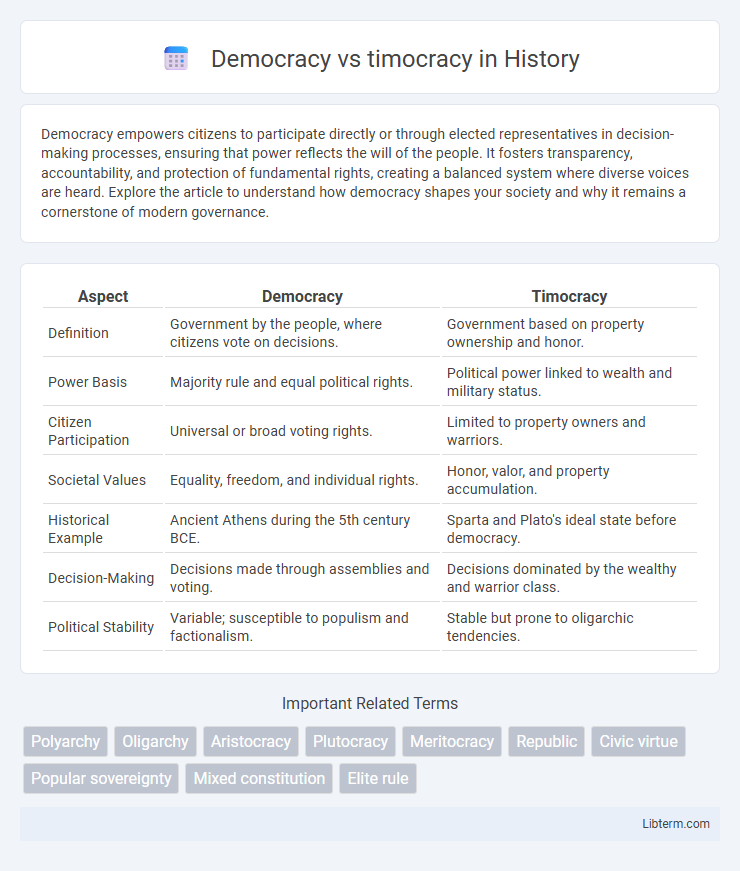Democracy empowers citizens to participate directly or through elected representatives in decision-making processes, ensuring that power reflects the will of the people. It fosters transparency, accountability, and protection of fundamental rights, creating a balanced system where diverse voices are heard. Explore the article to understand how democracy shapes your society and why it remains a cornerstone of modern governance.
Table of Comparison
| Aspect | Democracy | Timocracy |
|---|---|---|
| Definition | Government by the people, where citizens vote on decisions. | Government based on property ownership and honor. |
| Power Basis | Majority rule and equal political rights. | Political power linked to wealth and military status. |
| Citizen Participation | Universal or broad voting rights. | Limited to property owners and warriors. |
| Societal Values | Equality, freedom, and individual rights. | Honor, valor, and property accumulation. |
| Historical Example | Ancient Athens during the 5th century BCE. | Sparta and Plato's ideal state before democracy. |
| Decision-Making | Decisions made through assemblies and voting. | Decisions dominated by the wealthy and warrior class. |
| Political Stability | Variable; susceptible to populism and factionalism. | Stable but prone to oligarchic tendencies. |
Introduction: Understanding Democracy and Timocracy
Democracy is a political system where power is vested in the hands of the people, typically through elected representatives, emphasizing equal participation and majority rule. Timocracy, rooted in classical philosophy, is a form of government where political power is linked to property ownership or military achievement, prioritizing honor and wealth as criteria for governance. Understanding these systems requires analyzing their foundational principles, citizen roles, and the impact on societal structure and governance legitimacy.
Historical Origins of Democracy and Timocracy
Democracy originated in ancient Athens around the 5th century BCE, where citizens participated directly in decision-making processes, establishing the foundation for modern representative government systems. Timocracy, derived from the Greek terms "time" (honor) and "kratos" (power), was a form of government in ancient Athens characterized by political power based on property ownership and military service. Plato's "Republic" critically contrasted democracy and timocracy, highlighting timocracy's emergence from aristocracy and its emphasis on honor and wealth as qualifications for governance.
Core Principles: What Defines Democracy?
Democracy is defined by the core principle of political equality, where all citizens have an equal right to participate in decision-making processes, typically through voting and representation. It emphasizes individual freedoms, protection of rights, and majority rule balanced by minority protections to ensure fair governance. Accountability, transparency, and the rule of law are fundamental, ensuring leaders are elected by the people and govern according to established constitutional frameworks.
Core Principles: What Defines Timocracy?
Timocracy is defined by governance based on property ownership and military service, where political power is tied to land ownership or warrior status rather than equal citizen participation. Core principles emphasize honor, duty, and merit, contrasting with democracy's foundation of political equality and majority rule. This system prioritizes the interests of property holders and those who contribute to state security over universal enfranchisement.
Governing Structures: Comparing Political Frameworks
Democracy features a political framework where power is vested in the hands of the general populace through elected representatives or direct voting, ensuring broad participation and equal political rights. Timocracy prioritizes property ownership or military service as qualifications for political participation, often leading to governance dominated by wealth or martial values. The governing structure in democracy emphasizes inclusivity and majority rule, whereas timocracy restricts authority based on status or economic contribution, reflecting fundamentally different approaches to political legitimacy and decision-making.
Citizen Participation: Inclusion vs. Restriction
Democracy emphasizes widespread citizen participation, ensuring inclusive decision-making where every eligible individual has the right to vote and contribute to governance processes. Timocracy restricts political power to property owners or those with a certain wealth, limiting participation and privileging economic status over equal representation. This fundamental distinction shapes how policies reflect public interests, with democracy promoting broader inclusivity and timocracy reinforcing socio-economic hierarchies.
Power Distribution: Economic Influence and Authority
In democracy, power distribution typically emphasizes political equality, limiting economic influence to prevent wealth from dominating decision-making processes. Timocracy allocates authority based on property ownership or wealth, granting greater political power to those with significant economic resources. This system inherently links governance to economic status, creating a hierarchy where property and wealth directly determine political influence.
Strengths and Weaknesses of Democracy
Democracy promotes political equality and citizen participation, enabling diverse viewpoints to influence decision-making, which enhances legitimacy and accountability. However, it faces challenges such as the potential for majority tyranny, slow policy implementation, and vulnerability to populism or misinformation. Robust democratic institutions and informed electorates are essential to mitigate these weaknesses and sustain effective governance.
Strengths and Weaknesses of Timocracy
Timocracy, a government system where honor and property ownership determine political participation, emphasizes civic responsibility and fosters social cohesion among landowners. This system promotes stability through the vested interest of property holders in governance but tends to exclude lower classes, limiting broad representation and risking authoritarian tendencies. The reliance on wealth and honor can undermine meritocracy, potentially stagnating political innovation and encouraging elitism.
Modern Relevance: Democracy and Timocracy in Today’s World
Modern democracy prioritizes individual rights, political equality, and citizen participation, making it the dominant governance model in most countries. Timocracy, where property ownership and wealth influence political power, remains relevant in some oligarchic and corporatist systems subtly shaping policy decisions. The ongoing tension between egalitarian democratic principles and economically driven timocratic tendencies influences global political dynamics and social equity debates.
Democracy Infographic

 libterm.com
libterm.com